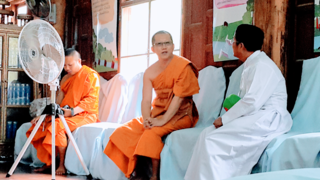Related Research Articles

The status of religious freedom around the world varies from country to country. States can differ based on whether or not they guarantee equal treatment under law for followers of different religions, whether they establish a state religion, the extent to which religious organizations operating within the country are policed, and the extent to which religious law is used as a basis for the country's legal code.
The Constitution provides for freedom of religion, but the government imposes onerous criteria on religious groups for official recognition, which is required for the legal construction of houses of worship. There is no registered muslim groups in Angola.
The Constitution provides for freedom of religion, and the Government generally respected this right in practice. There were no reports of societal abuses or discrimination based on religious belief or practice, and prominent societal leaders took positive steps to promote religious freedom.
The Constitution of Burkina Faso provides freedom of religion, and the Government respects this right in practice. Government policy contributes to the generally free practice of religion. There were no reports of societal abuses or discrimination based on religious belief or practice; however, at times community members forced older women falsely accused of being witches to flee their villages.
The Constitution of Burundi provides for freedom of religion, and the Government generally respects this right in practice. Government policy contributes to the generally free practice of religion. In a 2007 US Government study, there were no reports of societal abuses or discrimination based on religious belief or practice.
The constitution of Cape Verde provides for freedom of religion, and the government has generally respected this right in practice. Government policy continued to contribute to the generally free practice of religion. There were no reports of societal abuses or discrimination based on religious belief or practice.
The Constitution provides for freedom of religion, although it prohibits what the Government considers to be religious fundamentalism.
The Transitional Charter of October 2022 established Chad as a secular state and affirmed the separation of religion and state; it also provided for freedom of religion.
Freedom of religion in Comoros is addressed in the constitution which proclaims equality of rights and obligations for everyone.

The Constitution provides for freedom of religion, and the government has generally respected this right in practice. Buddhism is the state religion.
Freedom of religion in Taiwan is provided for by the Constitution of the Republic of China, which is in force on Taiwan. Taiwan's government generally respects freedom of religion in practice, with policies which contribute to the generally free practice of religion.

According to the 2018 census, Buddhism is the largest religion in Thailand, practiced by over 94% of the population; Islam makes up 5% of the population. The Thai government officially recognizes five religions: Buddhism, Islam, Hinduism, Sikhism, and Christianity.
In Qatar, the Constitution, as well as certain laws, provide for freedom of association, public assembly, and worship in accordance with the requirements of public order and morality. Notwithstanding this, the law prohibits proselytizing by non-Muslims and places some restrictions on public worship. Islam is the state religion.

Christianity is the majority religion in Cameroon, with significant minorities of the adherents of Islam and traditional faiths.

Christianity is the predominant religion in Solomon Islands, with Anglicanism being the single largest denomination.

Christianity has been the main religion in the Marshall Islands ever since it was introduced by European missionaries in the 19th century.

Christianity is the largest religion in Nauru, with Nauru Congregational Church being the largest denomination, encompassing 35.71% of the population as of the 2011 census.

Religion in Suriname is characterized by a range of religious beliefs and practices due to its ethnic diversity. The government is vocally supportive of religious diversity and tolerance, and these attitudes are present in general society as well. According to the most recent census (2012), 48.4 percent of the population is Christian 22.3 percent is Hindu, 13.9 percent is Muslim, 1.8 percent follows Winti, and 0.8 percent is Kejawen. In addition 2.1 percent of the population follows other faiths, 7.5 percent are atheist or agnostic, and 3.2 percent did not answer the question about their religion. Later estimates suggest that Christians made up just over half the population in 2020.
The status of religious freedom in Africa varies from country to country. States can differ based on whether or not they guarantee equal treatment under law for followers of different religions, whether they establish a state religion, the extent to which religious organizations operating within the country are policed, and the extent to which religious law is used as a basis for the country's legal code.
The status of religious freedom in North America varies from country to country. States can differ based on whether or not they guarantee equal treatment under law for followers of different religions, whether they establish a state religion, the extent to which religious organizations operating within the country are policed, and the extent to which religious law is used as a basis for the country's legal code.
References
- ↑ US State Dept 2022 report
- ↑ Wayi E. Mico (2016),A social analysis of the Religious situation in Cameroon.
- ↑ The ARDA website, Retrieved 2021-08-01
- ↑ US State Dept 2022 report
- ↑ Freedom House website, Retrieved 2023-08-01
- ↑ Open Doors website, Retrieved 2023-08-01
- ↑ US State Dept 2007 International Religious Freedom Report in Cameroon. This article incorporates text from this source, which is in the public domain.
- ↑ US State Dept 2022 report on Religious Freedom in Cameroon
- United States Bureau of Democracy, Human Rights and Labor. Cameroon: International Religious Freedom Report 2007. This article incorporates text from this source, which is in the public domain.